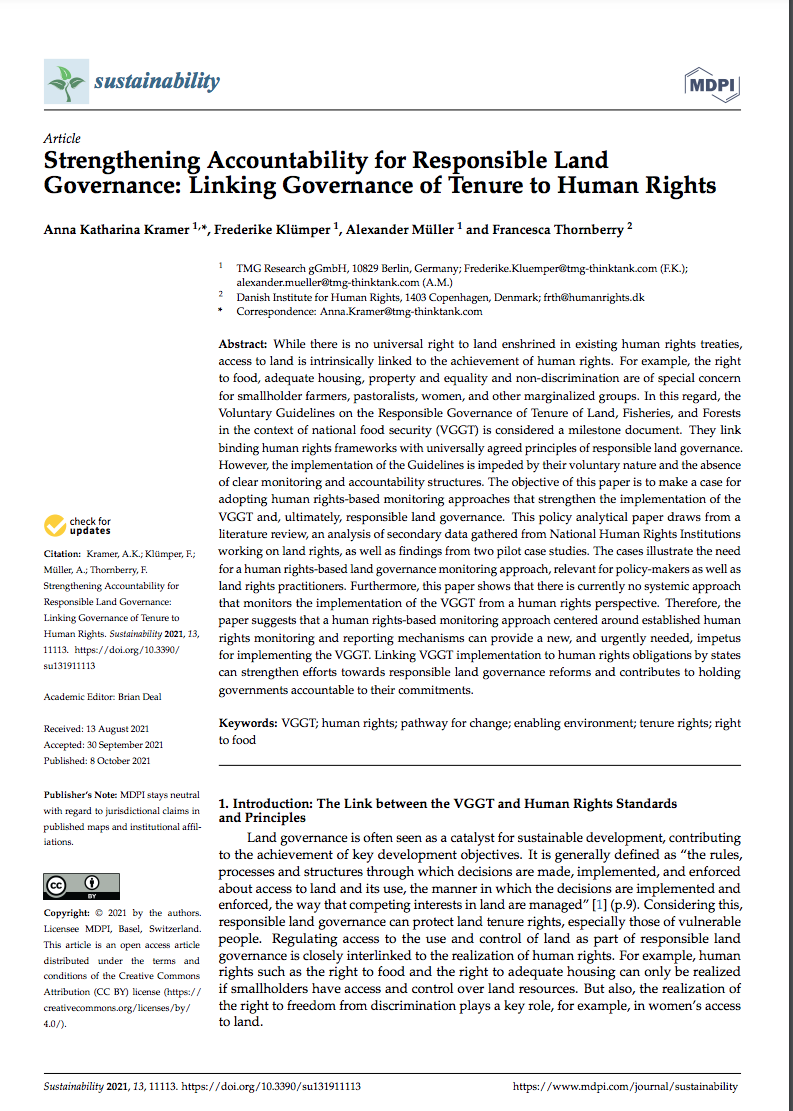Location
MDPI AG, a publisher of open-access scientific journals, was spun off from the Molecular Diversity Preservation International organization. It was formally registered by Shu-Kun Lin and Dietrich Rordorf in May 2010 in Basel, Switzerland, and maintains editorial offices in China, Spain and Serbia. MDPI relies primarily on article processing charges to cover the costs of editorial quality control and production of articles. Over 280 universities and institutes have joined the MDPI Institutional Open Access Program; authors from these organizations pay reduced article processing charges. MDPI is a member of the Committee on Publication Ethics, the International Association of Scientific, Technical, and Medical Publishers, and the Open Access Scholarly Publishers Association (OASPA).
Members:
Resources
Displaying 656 - 660 of 1524A Framework for Comparative Assessment of Indigenous Land Governance
Indigenous peoples are increasingly important players in the management and use of land and natural landscapes, bound in spiritual and traditional practices that endure and pre-date colonisation. This also extends to the aspirations that Indigenous traditional owners may have to generate income from land and to sustain business and employment opportunities that enable reinvestment in local communities. The paper draws from a study undertaken while the authors were at the Organisation of Economic Co-operation and Development (OECD) that involved 13 countries.
Causes and Countermeasures for the Failure of Mining Land Use Policy Reform: Practice Analysis from China
The current supply method of land acquisition for mining land in China is not conducive to the sustainable use of land resources, resulting in a large amount of wasted land resources and causing many conflicts. The new model of temporary land use policy for mining solves the long-standing problem of the livelihood of expropriated farmers that has plagued local governments, and also helps to alleviate the conflicts between enterprises and farmers. However, the temporary land use policy is in the practice stage, and the policy failure has resulted in low land reclamation rates.
Modeling Cultural Keystone Species for the Conservation of Biocultural Diversity in the Afroalpine
Climate warming threatens the future sustainability of mountains, and tropical mountains are particularly threatened with loss of biodiversity and associated ecosystem services. Conservation biologists increasingly turn to habitat suitability models to guide the establishment and assessment of protected area networks to protect the highest number of species, yet this focus often neglects the values, attitudes, and beliefs of the people living around protected areas.
Strengthening Accountability for Responsible Land Governance: Linking Governance of Tenure to Human Rights
In a new paper, written with a colleague from the Danish Institute for Human Rights, TMG researchers Anna Kramer and Frederike Klümper, and TMG Managing Director Alexander Müller, make a case for adopting human rights-based monitoring approaches that strengthen the implementation of the Voluntary Guidelines on the Responsible Governance of Tenure of Land, Fisheries, and Forests (VGGT), and ultimately support responsible land governance.
Fit-for-Purpose Land Administration—Providing Secure Land Rights at Scale
This Special Issue provides an insight, collated from 26 articles, focusing on various aspects of the Fit-for-Purpose Land Administration (FFPLA) concept and its application. It presents some influential and innovative trends and recommendations for designing, implementing, maintaining and further developing FFP solutions for providing secure land rights at scale. The first group of 14 articles is published in Volume One and discusses various conceptual innovations related to spatial, legal and institutional aspects of FFPLA and its wider applications within land use management.





